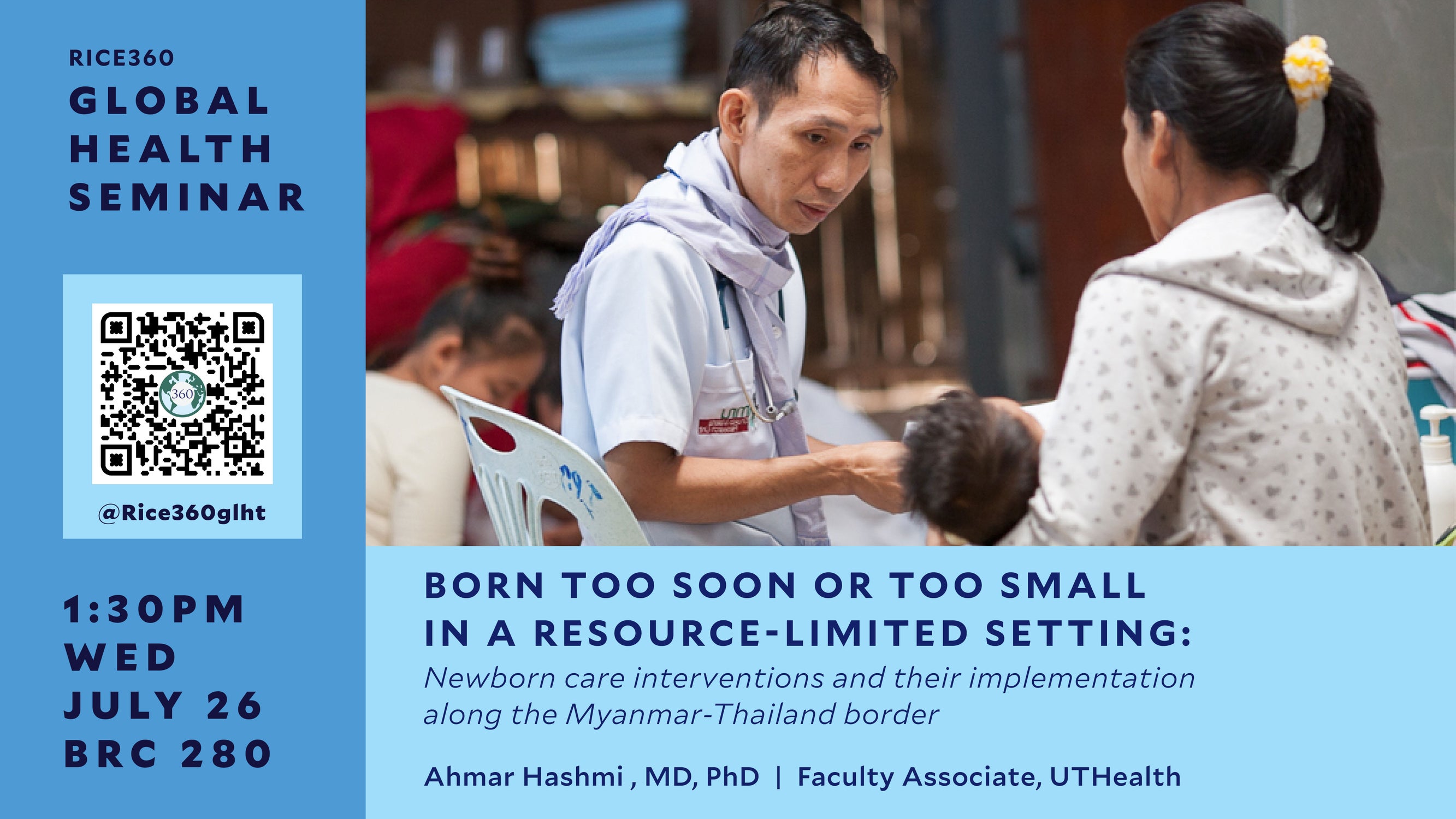Dr. Ahmar Hashmi, MD, PhD, Faculty Associate from the Institute for Implementation Science at the University of Texas Health Sciences Center, Houston, presented his work and recently published paper, Born Too Soon or Too Small in a Resource-Limited Setting: Newborn Care Interventions and Their Implementation Along the Myanmar-Thailand border at Rice360 Institute for Global Health Technologies on July 26, 2023.
Click the video below to watch the recorded seminar. Below is a summary of Dr. Hashmi’s talk, scroll to continue reading.
Born too soon: Dr Hashmi presents on newborn care interventions along the Myanmar-Thailand border
Dr. Hashmi’s global health experience includes eight years of living and working in low- and middle-income settings, specifically the Shoklo Malaria Research Unit located on the Myanmar-Thailand border. He noted that this unit focuses on health care beyond Malaria, including neonatal care. In this low-resource healthcare setting, Dr. Hasmi and his team have performed mixed-methods research on newborn care interventions.
Dr. Hasmi presented his analysis of the effectiveness of the technologies designed for use in the special care baby units that are part of the care environment where he works. He discussed a jaundice detection point-of-care test as an example. He explained that analysis can determine the effectiveness of innovations and reveal how other considerations within a specific setting can impact effectiveness. His mixed-methods study examined the jaundice test’s accuracy and usability within their specific care environment at the clinic along the Myanmar-Thailand border, presenting those findings and methodologies in his talk. He discussed his team’s experiences with innovations for diagnosing jaundice in newborns.
He expanded upon how limitations in some innovations are only found when examined within the care context where they are used. He explained how implementation science can assist with these types of evaluations and how the concept of a package of newborn interventions can improve newborn care beyond a single solution, such as a jaundice test.
The study concluded, "Given its lack of utility in younger neonates and its inaccuracy at high humidity and HCT levels, this study concludes that Bilistick in its current configuration is not reliable for early screening of NH in this tropical setting.”
Once it was determined that the jaundice detection device would be inadequate in the care setting where they work, the team looked for an alternative for detecting jaundice in neonates. They focused on innovations in detecting a deficiency of glucose-6-phosphate dehydrogenase (G6PD) in newborns, which is strongly associated with neonatal hyperbilirubinemia (jaundice). They published an evaluation of a point-of-care test for G6PD that uses a newborn’s cord blood to identify infants at higher risk for jaundice based on this deficiency. Knowing which babies are at risk for jaundice due to a deficiency in G6PD would allow care teams to proactively identify, monitor, and treat those infants for jaundice.
“In settings where phototherapy is available, this study indicates that the Biosensor [G6PD POC test] is a better option than FST [qualitative test and gold standard] to support clinical management of neonates.”
Following these examples of evaluating health innovations for low-resource settings, Dr. Hashmi shifted to discussing implementation science and the application of implementation science within global health innovation. He noted that implementation science research is beneficial to understanding the effectiveness of interventions in specific clinical settings and directed the audience to use the University of Washington online resource on implementation science.
At the conclusion of the talk, he shared lessons learned on reducing neonatal mortality in this community. He said one thing he learned is that having the will within the community to want to do things that can be done to reduce the mortality rate through effective interventions is key.

